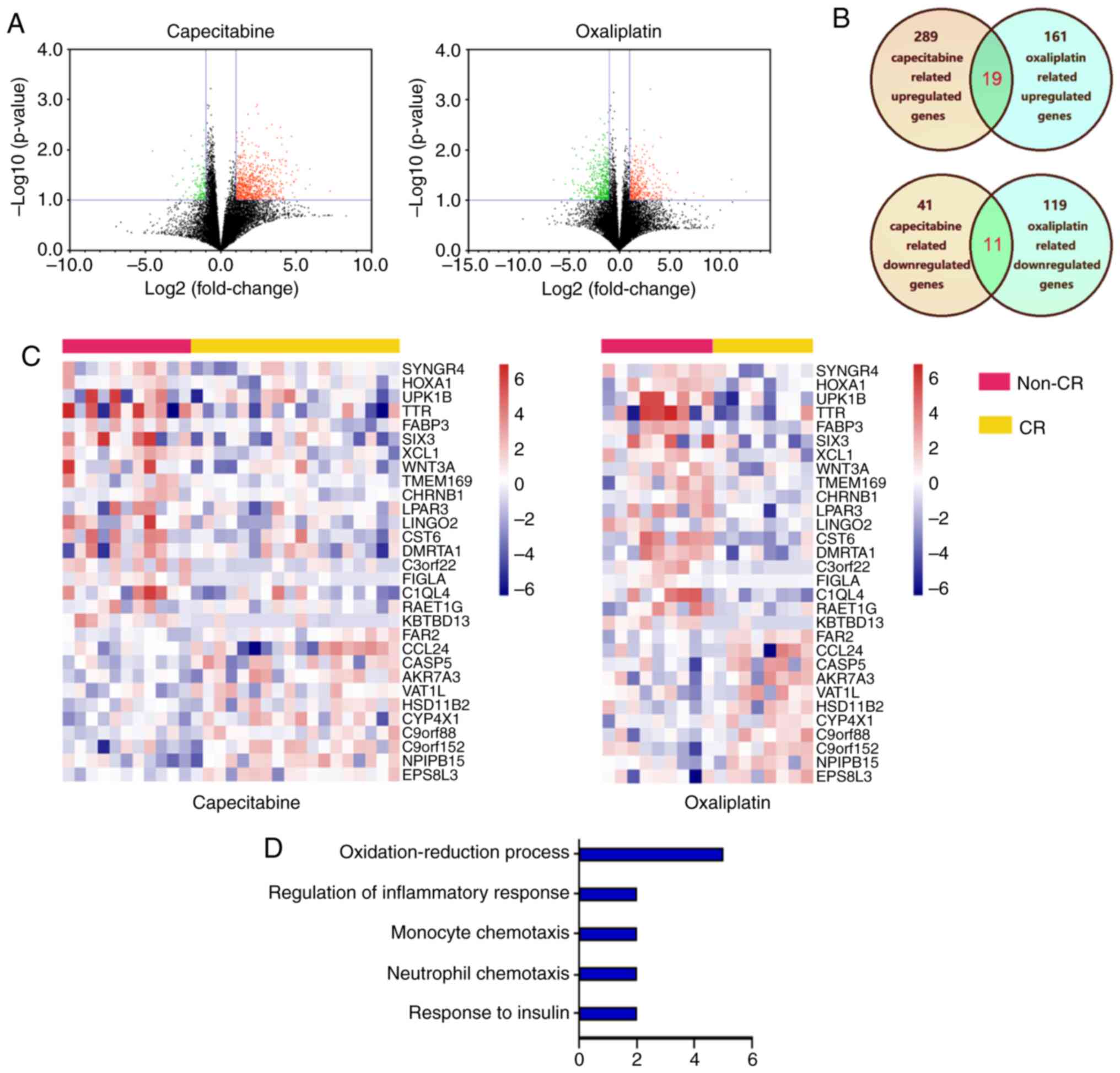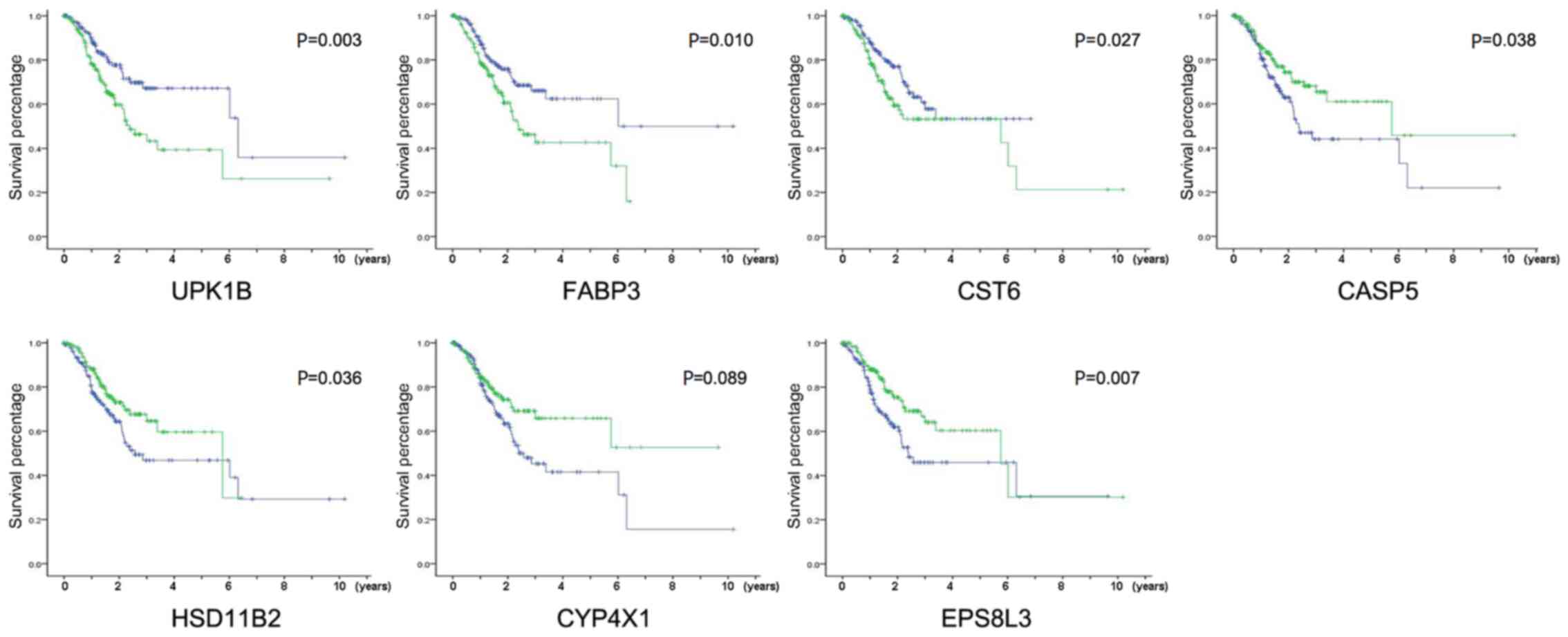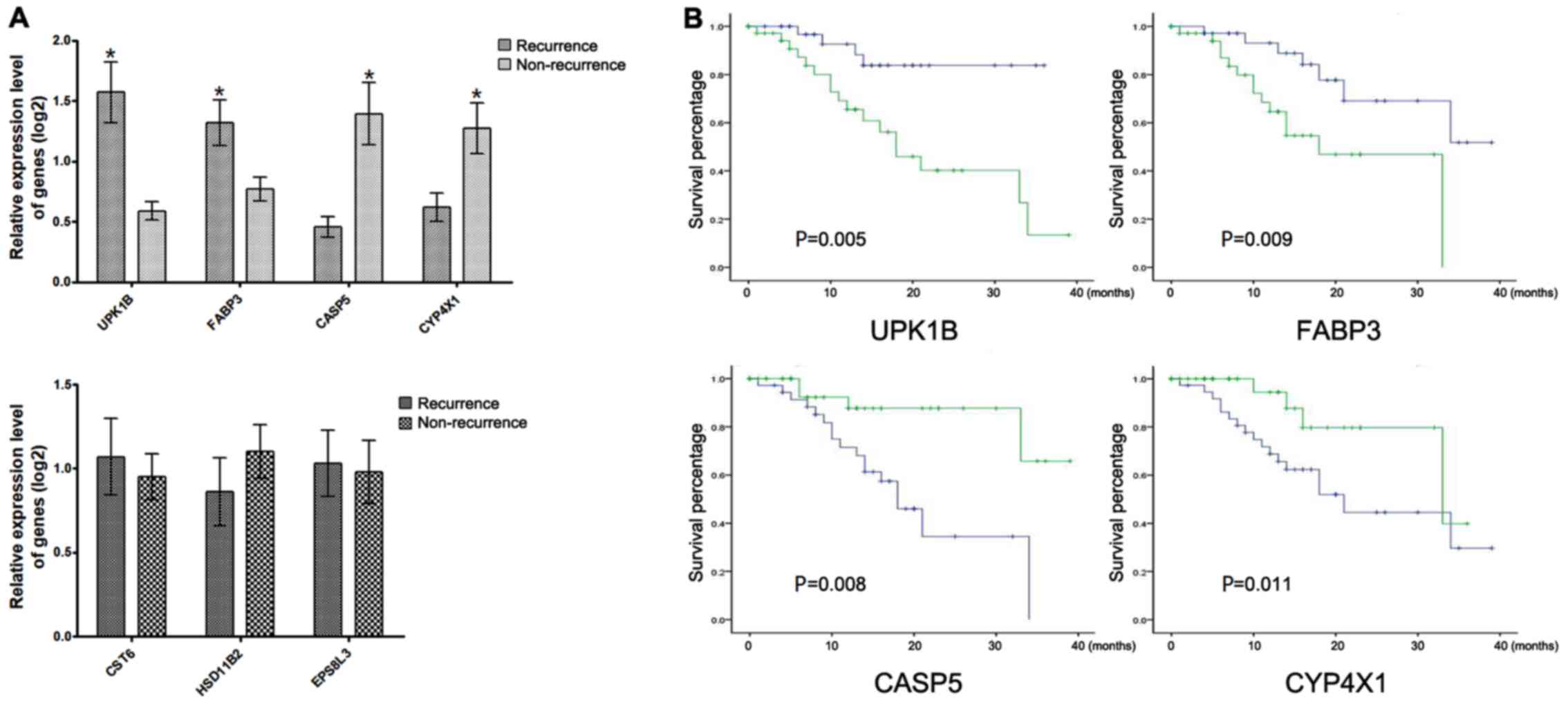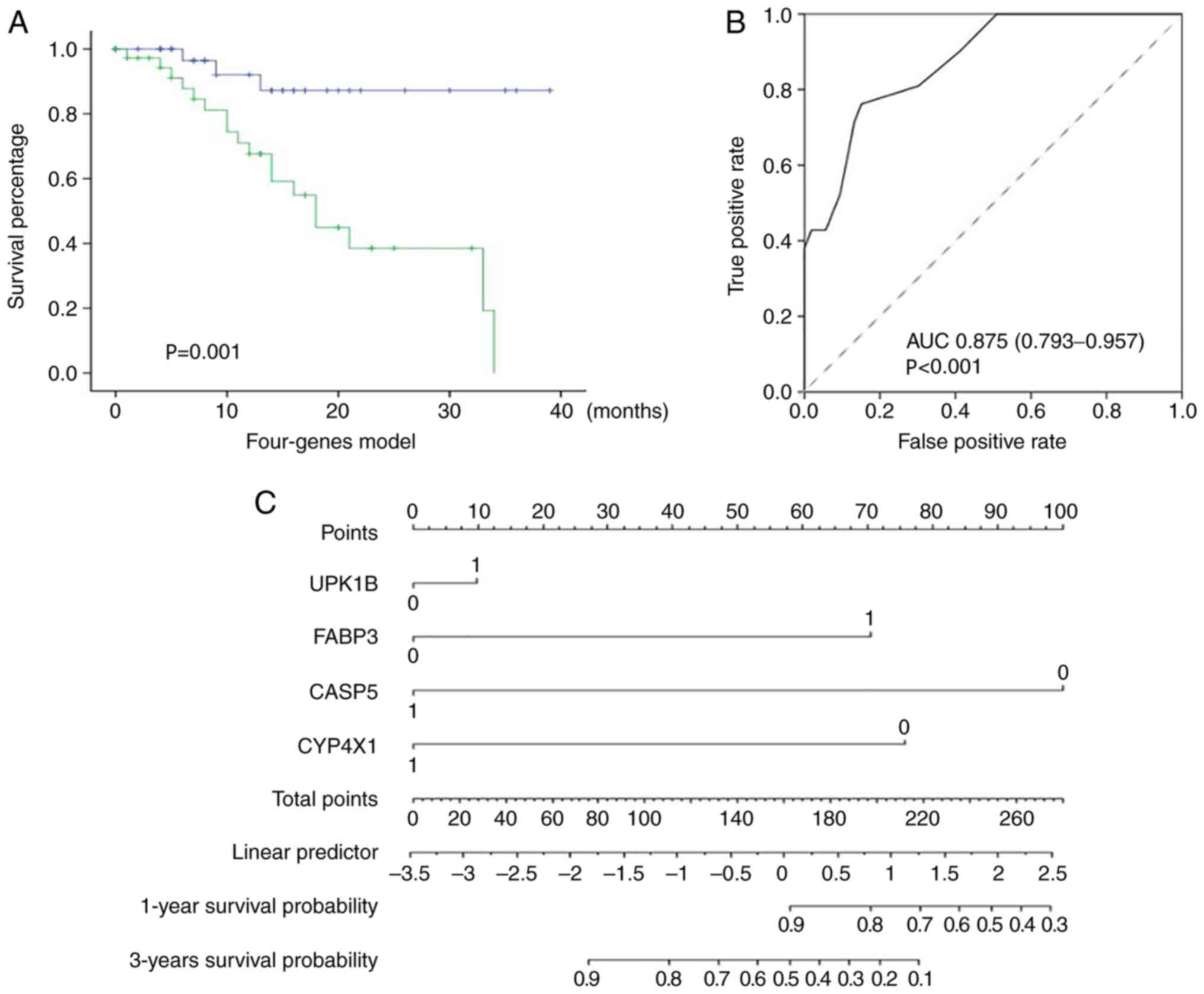|
1
|
Bray F, Ferlay J, Soerjomataram I, Siegel
RL, Torre LA and Jemal A: Global cancer statistics 2018: GLOBOCAN
estimates of incidence and mortality worldwide for 36 cancers in
185 countries. CA Cancer J Clin. 68:394–424. 2018. View Article : Google Scholar : PubMed/NCBI
|
|
2
|
Cainap C, Vlad C, Seicean A, Balacescu O,
Seicean R, Constantin AM, Balacescu L, Crisan O, Marta MM and
Cainap S: Gastric cancer: Adjuvant chemotherapy versus
chemoradiation. A clinical point of view. J BUON. 24:2209–2219.
2019.PubMed/NCBI
|
|
3
|
Xue K, Ying X, Bu Z, Wu A, Li Z, Tang L,
Zhang L, Zhang Y, Li Z and Ji J: Oxaliplatin plus S-1 or
capecitabine as neoadjuvant or adjuvant chemotherapy for locally
advanced gastric cancer with D2 lymphadenectomy: 5-year follow-up
results of a phase II–III randomized trial. Chin J Cancer Res.
30:516–525. 2018. View Article : Google Scholar : PubMed/NCBI
|
|
4
|
Lu Z, Zhang X, Liu W, Liu T, Hu B, Li W,
Fan Q, Xu J, Xu N, Bai Y, et al: A multicenter, randomized trial
comparing efficacy and safety of paclitaxel/capecitabine and
cisplatin/capecitabine in advanced gastric cancer. Gastric Cancer.
21:782–791. 2018. View Article : Google Scholar : PubMed/NCBI
|
|
5
|
Ahmad S: Platinum-DNA interactions and
subsequent cellular processes controlling sensitivity to anticancer
platinum complexes. Chem Biodivers. 7:543–566. 2010. View Article : Google Scholar : PubMed/NCBI
|
|
6
|
Peng J, Tan C, Zeng X and Liu S:
Cost-effectiveness analysis of capecitabine monotherapy versus
capecitabine plus oxaliplatin in elderly patients with advanced
gastric cancer. PLoS One. 13:e01995532018. View Article : Google Scholar : PubMed/NCBI
|
|
7
|
Kim ST, Ahn S, Lee J, Lee SJ, Park SH,
Park YS, Lim HY, Kang WK, Kim KM and Park JO: Value of FGFR2
expression for advanced gastric cancer patients receiving pazopanib
plus CapeOX (capecitabine and oxaliplatin). J Cancer Res Clin
Oncol. 142:1231–1237. 2016. View Article : Google Scholar : PubMed/NCBI
|
|
8
|
Fan B, Shen C, Wu M, Zhao J, Guo Q and Luo
Y: MiR-17-92 cluster is connected with disease progression and
oxaliplatin/capecitabine chemotherapy efficacy in advanced gastric
cancer patients: A preliminary study. Medicine (Baltimore).
97:e120072018. View Article : Google Scholar : PubMed/NCBI
|
|
9
|
Livak KJ and Schmittgen TD: Analysis of
relative gene expression data using real-time quantitative PCR and
the 2(-Delta Delta C(T)) method. Methods. 25:402–408. 2001.
View Article : Google Scholar : PubMed/NCBI
|
|
10
|
RStudio Team (2015). RStudio. Integrated
Development for R. RStudio, Inc.; Boston, MA: http://www.rstudio.com/
|
|
11
|
Yu J, Gao J, Lu Z, Li Y and Shen L: Serum
levels of TUBB3 correlate with clinical outcome in Chinese patients
with advanced gastric cancer receiving first-line paclitaxel plus
capecitabine. Med Oncol. 29:3029–3034. 2012. View Article : Google Scholar : PubMed/NCBI
|
|
12
|
Huang H, Han Y, Gao J, Feng J, Zhu L, Qu
L, Shen L and Shou C: High level of serum AMBP is associated with
poor response to paclitaxel-capecitabine chemotherapy in advanced
gastric cancer patients. Med Oncol. 30:7482013. View Article : Google Scholar : PubMed/NCBI
|
|
13
|
Bi J, Bai Z, Ma X, Song J, Guo Y, Zhao J,
Yi X, Han S and Zhang Z: Txr1: An important factor in oxaliplatin
resistance in gastric cancer. Med Oncol. 31:8072014. View Article : Google Scholar : PubMed/NCBI
|
|
14
|
Liu D, Zhou H, Wu J, Liu W, Li Y, Shi G,
Yue X, Sun X, Zhao Y, Hu X, et al: Infection by Cx43 adenovirus
increased chemotherapy sensitivity in human gastric cancer BGC-823
cells: Not involving in induction of cell apoptosis. Gene.
574:217–224. 2015. View Article : Google Scholar : PubMed/NCBI
|
|
15
|
Danza K, Silvestris N, Simone G, Signorile
M, Saragoni L, Brunetti O, Monti M, Mazzotta A, De Summa S, Mangia
A and Tommasi S: Role of miR-27a, miR-181a and miR-20b in gastric
cancer hypoxia-induced chemoresistance. Cancer Biol Ther.
17:400–406. 2016. View Article : Google Scholar : PubMed/NCBI
|
|
16
|
Zhou R, Zeng D, Zhang J, Sun H, Wu J, Li
N, Liang L, Shi M, Bin J, Liao Y, et al: A robust panel based on
tumour microenvironment genes for prognostic prediction and
tailoring therapies in stage I–III colon cancer. EBioMedicine.
42:420–430. 2019. View Article : Google Scholar : PubMed/NCBI
|
|
17
|
Pichler R, Fritz J, Tulchiner G,
Klinglmair G, Soleiman A, Horninger W, Klocker H and Heidegger I:
Increased accuracy of a novel mRNA-based urine test for bladder
cancer surveillance. BJU Int. 121:29–37. 2018. View Article : Google Scholar : PubMed/NCBI
|
|
18
|
Dai J, Li ZX, Zhang Y, Ma JL, Zhou T, You
WC, Li WQ and Pan KF: Whole genome messenger RNA profiling
identifies a novel signature to predict gastric cancer survival.
Clin Transl Gastroenterol. 10:e000042019. View Article : Google Scholar : PubMed/NCBI
|
|
19
|
Wang FH, Ma XJ, Xu D and Luo J: UPK1B
promotes the invasion and metastasis of bladder cancer via
regulating the Wnt/β-catenin pathway. Eur Rev Med Pharmacol Sci.
22:5471–5480. 2018.PubMed/NCBI
|
|
20
|
Kukcinaviciute E, Jonusiene V,
Sasnauskiene A, Dabkeviciene D, Eidenaite E and Laurinavicius A:
Significance of Notch and Wnt signaling for chemoresistance of
colorectal cancer cells HCT116. J Cell Biochem. 119:5913–5920.
2018. View Article : Google Scholar : PubMed/NCBI
|
|
21
|
Levi L, Wang Z, Doud MK, Hazen SL and Noy
N: Saturated fatty acids regulate retinoic acid signalling and
suppress tumorigenesis by targeting fatty acid-binding protein 5.
Nat Commun. 6:87942015. View Article : Google Scholar : PubMed/NCBI
|
|
22
|
Yarla NS, Bishayee A, Sethi G, Reddanna P,
Kalle AM, Dhananjaya BL, Dowluru KS, Chintala R and Duddukuri GR:
Targeting arachidonic acid pathway by natural products for cancer
prevention and therapy. Semin Cancer Biol. 40-41:48–81. 2016.
View Article : Google Scholar : PubMed/NCBI
|
|
23
|
Hyvonen M, Enback J, Huhtala T, Lammi J,
Sihto H, Weisell J, Joensuu H, Rosenthal-Aizman K, El-Andaloussi S,
Langel U, et al: Novel target for peptide-based imaging and
treatment of brain tumors. Mol Cancer Ther. 13:996–1007. 2014.
View Article : Google Scholar : PubMed/NCBI
|
|
24
|
Lopes-Coelho F, Andre S, Felix A and Serpa
J: Breast cancer metabolic cross-talk: Fibroblasts are hubs and
breast cancer cells are gatherers of lipids. Mol Cell Endocrinol.
462:93–106. 2018. View Article : Google Scholar : PubMed/NCBI
|
|
25
|
Hashimoto T, Kusakabe T, Sugino T, Fukuda
T, Watanabe K, Sato Y, Nashimoto A, Honma K, Kimura H, Fujii H and
Suzuki T: Expression of heart-type fatty acid-binding protein in
human gastric carcinoma and its association with tumor
aggressiveness, metastasis and poor prognosis. Pathobiology.
71:267–273. 2004. View Article : Google Scholar : PubMed/NCBI
|
|
26
|
Tang Z, Shen Q, Xie H, Zhou X, Li J, Feng
J, Liu H, Wang W, Zhang S and Ni S: Elevated expression of FABP3
and FABP4 cooperatively correlates with poor prognosis in non-small
cell lung cancer (NSCLC). Oncotarget. 7:46253–46262. 2016.
View Article : Google Scholar : PubMed/NCBI
|
|
27
|
Deshmukh SK, Srivastava SK, Poosarla T,
Dyess DL, Holliday NP, Singh AP and Singh S: Inflammation,
immunosuppressive microenvironment and breast cancer: Opportunities
for cancer prevention and therapy. Ann Transl Med. 7:5932019.
View Article : Google Scholar : PubMed/NCBI
|
|
28
|
Wang Z, Ni F, Yu F, Cui Z, Zhu X and Chen
J: Prognostic significance of mRNA expression of CASPs in gastric
cancer. Oncol Lett. 18:4535–4554. 2019.PubMed/NCBI
|
|
29
|
Li H, Li Y, Cai L, Bai B and Wang Y:
Effects of CASP5 gene overexpression on angiogenesis of HMEC-1
cells. Int J Clin Exp Pathol. 8:15794–15800. 2015.PubMed/NCBI
|
|
30
|
Carver KA, Lourim D, Tryba AK and Harder
DR: Rhythmic expression of cytochrome P450 epoxygenases CYP4×1 and
CYP2c11 in the rat brain and vasculature. Am J Physiol Cell
Physiol. 307:C989–C998. 2014. View Article : Google Scholar : PubMed/NCBI
|
|
31
|
Manikandan P and Nagini S: Cytochrome P450
structure, function and clinical significance: A review. Curr Drug
Targets. 19:38–54. 2018. View Article : Google Scholar : PubMed/NCBI
|
|
32
|
Russo A, Biselli-Chicote PM,
Kawasaki-Oyama RS, Castanhole-Nunes MMU, Maniglia JV, de Santi Neto
D, Pavarino ÉC and Goloni-Bertollo EM: Differential expression of
prostaglandin i2 synthase associated with arachidonic acid pathway
in the oral squamous cell carcinoma. J Oncol. 2018:63019802018.
View Article : Google Scholar : PubMed/NCBI
|
|
33
|
Murray GI, Patimalla S, Stewart KN, Miller
ID and Heys SD: Profiling the expression of cytochrome P450 in
breast cancer. Histopathology. 57:202–211. 2010. View Article : Google Scholar : PubMed/NCBI
|
|
34
|
Kumar S: Computational identification and
binding analysis of orphan human cytochrome P450 4X1 enzyme with
substrates. BMC Res Notes. 8:92015. View Article : Google Scholar : PubMed/NCBI
|


















